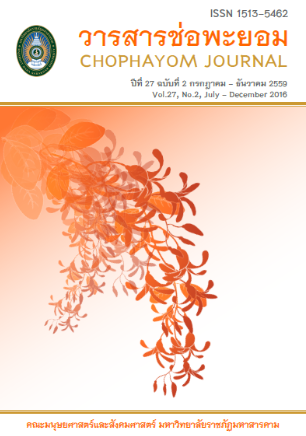กลวิธีความไม่สุภาพในการสัมภาษณ์บุคคลในกระแสของพิธีกรช่องโทรทัศน์ทางเลือกใหม่ Impoliteness Strategies for Interviewing Celebrities by Alternative Television Channel Hosts
Abstract
บทคัดย่อ
บทความนี้มีวัตถุประสงค์เพื่อศึกษาวิเคราะห์กลวิธีความไม่สุภาพในการใช้ภาษาสัมภาษณ์บุคคลในกระแสของพิธีกร
รายการโทรทัศน์ช่องทางเลือกใหม่ตามแนวคิดความไม่สุภาพทางภาษาศาสตร์ เก็บข้อมูลจากรายการสัมภาษณ์บุคคลในกระแสที่ออกอากาศทางช่องโทรทัศน์ทางเลือกใหม่ ผลการศึกษาพบว่า พิธีกรมี กลวิธีการใช้ภาษาในการดำเนินการสัมภาษณ์ด้วยกลวิธีความไม่สุภาพ ได้แก่ กลวิธีการถาม 6 กลวิธี คือการถามในเชิงดูถูกเพื่อยั่วยุอารมณ์ การถามแย้ง การถามชี้นำคำตอบ การถามด้วยถ้อยคำบ่งชี้เรื่องเพศและกามารมณ์ การถามรุกไล่ด้วยคำถามต่อเนื่อง การถามในลักษณะใส่ความหรือตัดสินชี้ขาด และใช้กลวิธีอื่นๆ 3 กลวิธี คือ การกล่าวเตือน การผรุสวาทหรือการสบถโดยใช้คำต้องห้ามหรือการใช้คำสแลงที่บ่งชี้ถึงคำหรือเรื่องต้องห้าม และการแสดงความเห็นในเชิงวิพากษ์วิจารณ์
Abstract
The objective of this article was to investigate the impoliteness strategies for interviewing the Thai celebrities by the Thai alternative television channel hosts based on the approach of linguistic impoliteness.The data were collected from the recorded interviews of the celebrities broadcasted on the Thai alternative television channels. The findings revealed that there were impoliteness strategies used by the television hosts during the interviews which included 6 asking strategies; allegedly asking as provocation, stating counter evidence, guiding to a certain answer, using sexual words, using a follow-up question, and asking as accusation. Moreover, there were also 3 other strategies; Warning, swearing or using taboo words or slangs, and criticizing




